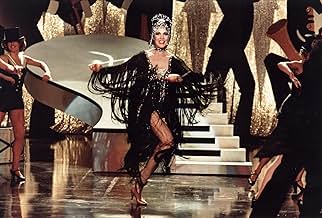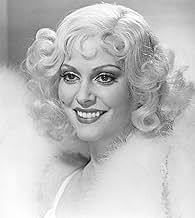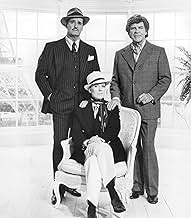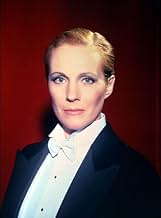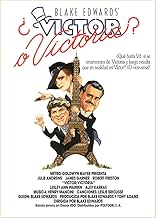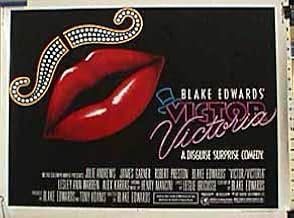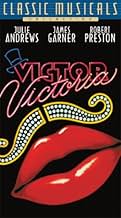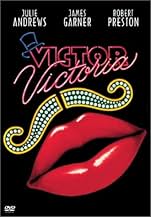Uma soprano lutadora encontra trabalho fazendo-se passar por um imitador, mas isso complica sua vida pessoal.Uma soprano lutadora encontra trabalho fazendo-se passar por um imitador, mas isso complica sua vida pessoal.Uma soprano lutadora encontra trabalho fazendo-se passar por um imitador, mas isso complica sua vida pessoal.
- Direção
- Roteiristas
- Artistas
- Ganhou 1 Oscar
- 11 vitórias e 18 indicações no total
Herb Tanney
- Charles Bovin
- (as Sherloque Tanney)
Matyelok Gibbs
- Cassell's Receptionist
- (as Matyelock Gibbs)
- Direção
- Roteiristas
- Elenco e equipe completos
- Produção, bilheteria e muito mais no IMDbPro
Avaliações em destaque
My God, the reviewer before me MUST be mad!!! Either that, or he/she must be struggling with their own sexuality! THIS is one of my favorite movies of ALL time. Julie Andrews is in fine musical form; James Garner gives one of his greatest comedic performances since "The Americanization of Emily" (also with Julie Andrews) and Lesley Ann Warren just about steals the picture! This movie scores a solid "10" for comedy, a sterling "10" for music and a rousing "10" for romance! ANYONE that DOESN'T like this movie should suck an egg! HOW did Lesley Ann Warren NOT win an Oscar? Ditto, Robert Preston? I consider myself a guy's guy, but I confess I tear up every time I hear the opening refrains of Julie singing "Crazy World," the film's theme song. Bravo, Blake Edwards!!!
10srepka
"Victor/Victoria" was the film where Blake Edwards finally managed to deliver his valentine to his wife, Julie Andrews, and convince the public to join in. Maybe because of that, it's one of his most heartfelt movies, and the enormous love between the director and his star do as much to warm up this movie as the careful colour composition of Dick Bush's fantastic - and underrated - photography.
This is a film where everything works perfectly. The acting ranges from the impeccable (the leads) through the touching (Alex Karras) right to the truly sublime (Robert Preston and Lesley Ann-Warren). The musical numbers are lovingly staged and shot and, possibly because this is a pre-MTV film, we actually get to see dancers dancing, as opposed to machine-gun assemblies of body parts performing details of not necessarily connected movements. The directorial touch is assured, proficient but never showy: the many complicated set-ups are executed with elegance, economy - not a frivolous camera movement to be seen - and discretion. (The circular pan around Julie as she sings "Crazy World" is a lovely example of how camera movement can create emotion without drawing attention to itself.) The sets and costumes are lavish but, again, do not distract. The screenplay is witty, full of deft touches, and Edwards treats his rather daring (for 1982) theme without blinking, and with great lucidity. (The other drag film of the year was "Tootsie", which stuck to the romance and stayed away from uncomfortable homosexual touches as much as it managed to.) The timing never falters. And the score is priceless.
All in all, a flawless entertainment, which, like the best movies from the studio system's heyday of which "Victor / Victoria" is a proud and worthy descendant, rewards the attentive (and interested) viewer with far more substance - and style - than might appear at first. I do not have the space to analyse this film at the length it deserves; but I can recommend it, which I do wholeheartedly.
This is a film where everything works perfectly. The acting ranges from the impeccable (the leads) through the touching (Alex Karras) right to the truly sublime (Robert Preston and Lesley Ann-Warren). The musical numbers are lovingly staged and shot and, possibly because this is a pre-MTV film, we actually get to see dancers dancing, as opposed to machine-gun assemblies of body parts performing details of not necessarily connected movements. The directorial touch is assured, proficient but never showy: the many complicated set-ups are executed with elegance, economy - not a frivolous camera movement to be seen - and discretion. (The circular pan around Julie as she sings "Crazy World" is a lovely example of how camera movement can create emotion without drawing attention to itself.) The sets and costumes are lavish but, again, do not distract. The screenplay is witty, full of deft touches, and Edwards treats his rather daring (for 1982) theme without blinking, and with great lucidity. (The other drag film of the year was "Tootsie", which stuck to the romance and stayed away from uncomfortable homosexual touches as much as it managed to.) The timing never falters. And the score is priceless.
All in all, a flawless entertainment, which, like the best movies from the studio system's heyday of which "Victor / Victoria" is a proud and worthy descendant, rewards the attentive (and interested) viewer with far more substance - and style - than might appear at first. I do not have the space to analyse this film at the length it deserves; but I can recommend it, which I do wholeheartedly.
Dazzling art direction, lavish costumes, funny dialogue, a fabulous soundtrack, and Robert Preston make "Victor/Victoria" one of filmdom's most entertaining musicals of all time. Set in 1934 Paris, and filmed in luscious color, the film tells the story of two down and out friends who carry out an ingenious plan to get rich. Toddy (Robert Preston), a gay performer, persuades Victoria (Julie Andrews), a struggling singer, to change her appearance to that of a man so that she can pose on stage as a female impersonator. Blake Edwards converts the film's clever concept into a film of true cinematic flair and panache.
The film's music alone is enough to make "Victor/Victoria" a winner. With consummate verve, Andrews sings the lively "Le Jazz Hot", a stage performance that has been mimicked by, it seems, one in ten talent competitors in the Miss America Pageant for the last twenty years. The colorful song "The Shady Dame From Seville" is memorable as a cultural classic. Even the restrained "You And Me" is satisfying, with its old fashioned charm. And Henry Mancini's wistful and slightly melancholy original score adds melodic balance to the flashy stage numbers.
The casting is perfect. I cannot imagine anyone other than Julie Andrews as Victoria. James Garner is fine as King Marchand. And in support roles, Lesley Ann Warren adds sexy spunk as Norma, and Alex Karras is surprisingly effective as Marchand's bodyguard. But it is music man Robert Preston who leads this top notch Hollywood talent parade. Preston is likable throughout, and is a hoot in the film's finale.
If the film has a flaw, it might be in the editing. The plot in Act Two slows down. Or, to say it a little differently, it ... drags (so to speak). The 132 minute runtime is a tad long maybe, and so a few scene deletions here and there might have rendered a slight improvement in the pace. But, this is a minor issue, one that I raise only in my grasping-at-straws attempt to find something to complain about.
"Victor/Victoria" is an expressive, fun, one-of-a-kind musical garden party that easily makes my list of top fifty films ever made.
The film's music alone is enough to make "Victor/Victoria" a winner. With consummate verve, Andrews sings the lively "Le Jazz Hot", a stage performance that has been mimicked by, it seems, one in ten talent competitors in the Miss America Pageant for the last twenty years. The colorful song "The Shady Dame From Seville" is memorable as a cultural classic. Even the restrained "You And Me" is satisfying, with its old fashioned charm. And Henry Mancini's wistful and slightly melancholy original score adds melodic balance to the flashy stage numbers.
The casting is perfect. I cannot imagine anyone other than Julie Andrews as Victoria. James Garner is fine as King Marchand. And in support roles, Lesley Ann Warren adds sexy spunk as Norma, and Alex Karras is surprisingly effective as Marchand's bodyguard. But it is music man Robert Preston who leads this top notch Hollywood talent parade. Preston is likable throughout, and is a hoot in the film's finale.
If the film has a flaw, it might be in the editing. The plot in Act Two slows down. Or, to say it a little differently, it ... drags (so to speak). The 132 minute runtime is a tad long maybe, and so a few scene deletions here and there might have rendered a slight improvement in the pace. But, this is a minor issue, one that I raise only in my grasping-at-straws attempt to find something to complain about.
"Victor/Victoria" is an expressive, fun, one-of-a-kind musical garden party that easily makes my list of top fifty films ever made.
Despite all of its gender-bending commentary on sexuality, both hetero- and homo-, "Victor/Victoria" looked and sounded in 1982 (year of "ET" and "The Road Warrior") as if it were made in 1962 -- and that was a good thing. Blake Edwards' trademark ability to combine lush romanticism with immitable slapstick comedy was here matched by a wonderful score by his longtime collaborator Henry Mancini, "Voila!" -- we're back in the early sixties again. (It didn't hurt that stars Julie Andrews and James Garner were hottest in the sixties, and had acted together in 1964's "The Americanization of Emily.")
Robert Preston, "The Music Man" of late fifties Broadway and 1962 screen fame, further added an element of early sixties nostalgia -- with the twist that he here used his booming vocal tones in the service of a delightfully out and comfortable gay man. Preston was one of two hot contenders for the Best Supporting Actor Oscar that year. The winner was Lou Gossett, Jr. for his Drill Instructor in "An Officer And A Gentleman."
Rounding out the great cast are Lesley Ann Warren (sexy and very funny) in an Oscar-nominated role as Garner's mob moll floozie, and Alex Karras, continually funny as Garner's softhearted ox of a bodyguard. (Karras gets a classic Blake Edwards slapstick routine trapped in the freezing snow outside a Paris hotel, getting big laughs out of the simple line: "You've got heat? That's good.")
And be sure to keep a lookout for "Sherloque Tanney" as the French private detective on Victor/Victoria's trail. Tanney was Blake Edwards dentist, and appeared in almost every Blake Edwards film from "Darling Lili" (1970) on. Other than his corpse in "SOB," (1981), the French detective is possibly Dr. Tanney's greatest role on the screen. Tanney, too, gets to anchor several great trademark Blake Edwards slapstick routines.
Oh, and there's music, too. Enough music for a Broadway musical (which is what "Victor/Victoria" became), and with a sad and wistful Mancini title tune (reprised in the film by Andrews) that reminds one a bit of "Moon River" and "Days of Wine and Roses." Just like in the early sixties.
Robert Preston, "The Music Man" of late fifties Broadway and 1962 screen fame, further added an element of early sixties nostalgia -- with the twist that he here used his booming vocal tones in the service of a delightfully out and comfortable gay man. Preston was one of two hot contenders for the Best Supporting Actor Oscar that year. The winner was Lou Gossett, Jr. for his Drill Instructor in "An Officer And A Gentleman."
Rounding out the great cast are Lesley Ann Warren (sexy and very funny) in an Oscar-nominated role as Garner's mob moll floozie, and Alex Karras, continually funny as Garner's softhearted ox of a bodyguard. (Karras gets a classic Blake Edwards slapstick routine trapped in the freezing snow outside a Paris hotel, getting big laughs out of the simple line: "You've got heat? That's good.")
And be sure to keep a lookout for "Sherloque Tanney" as the French private detective on Victor/Victoria's trail. Tanney was Blake Edwards dentist, and appeared in almost every Blake Edwards film from "Darling Lili" (1970) on. Other than his corpse in "SOB," (1981), the French detective is possibly Dr. Tanney's greatest role on the screen. Tanney, too, gets to anchor several great trademark Blake Edwards slapstick routines.
Oh, and there's music, too. Enough music for a Broadway musical (which is what "Victor/Victoria" became), and with a sad and wistful Mancini title tune (reprised in the film by Andrews) that reminds one a bit of "Moon River" and "Days of Wine and Roses." Just like in the early sixties.
The first time I saw it, I thought it was "pretty good." Amusing, but I didn't expect to find myself watching it again.
It's unpretentious. It doesn't have Big Ideas or profound themes that you have to watch it twice to get.
But it's got lovable characters and a kickin' plot, and I happen to have a huge crush on the 1930s. I love the friendship between Victoria and Toddy because it feels so genuine and it's rare to see a friendship (particularly between men and women) portrayed so well in movies. I love the romance between Victoria and King, because they're well-matched, but at the same time the problems in their relationship are so realistic. Fundamental inability to compromise? I think everyone knows what that's like.
It's unpretentious. It doesn't have Big Ideas or profound themes that you have to watch it twice to get.
But it's got lovable characters and a kickin' plot, and I happen to have a huge crush on the 1930s. I love the friendship between Victoria and Toddy because it feels so genuine and it's rare to see a friendship (particularly between men and women) portrayed so well in movies. I love the romance between Victoria and King, because they're well-matched, but at the same time the problems in their relationship are so realistic. Fundamental inability to compromise? I think everyone knows what that's like.
Você sabia?
- CuriosidadesJulie Andrews' performance of "Le Jazz Hot," along with the verisimilitude of her performance generally, was made possible by her four octave vocal range, which allowed her to sing the low notes of a male tenor to the high notes of a female soprano with smooth transitions.
- Erros de gravaçãoWhen King turns on the radio, the sound comes on right away. In the old vacuum tube radios of the day, the filaments of the tubes would have to warm up before any sound emanates.
- Cenas durante ou pós-créditosThe opening credits are a montage of Art Deco illustrations, with most of them reflecting the functions of the credited persons.
Principais escolhas
Faça login para avaliar e ver a lista de recomendações personalizadas
- How long is Victor/Victoria?Fornecido pela Alexa
Detalhes
- Data de lançamento
- Países de origem
- Idiomas
- Também conhecido como
- Victor ou Victoria
- Locações de filme
- Empresas de produção
- Consulte mais créditos da empresa na IMDbPro
Bilheteria
- Faturamento bruto nos EUA e Canadá
- US$ 28.215.453
- Fim de semana de estreia nos EUA e Canadá
- US$ 139.634
- 21 de mar. de 1982
- Faturamento bruto mundial
- US$ 28.229.440
- Tempo de duração2 horas 14 minutos
- Cor
- Mixagem de som
- Proporção
- 2.35 : 1
Contribua para esta página
Sugerir uma alteração ou adicionar conteúdo ausente

Principal brecha
By what name was Vítor ou Vitória? (1982) officially released in India in Hindi?
Responda



